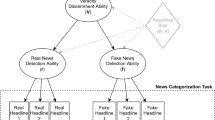Abstract
Economic motives are not the only reasons for committing a (small) crime. People consider social norms and perceptions of fairness before judging a situation and acting upon it. If someone takes a bundle of printing paper from the office for private use at home, then a colleague who sees this can take action by talking to the offender or someone else (peer reporting). We investigate how fairness perception influences the decision to act upon incorrect behavior or not.
Similar content being viewed by others
References
Barnett T., Bass K., Brown G. (1996) Religiosity, ethical ideology, and intentions to report a peer’s wrongdoing. Journal of Business Ethics 15: 1161–1174
Becker G. S. (1968) Crime and punishment: An economic approach. Journal of Political Economy 76: 169–217
De Graaf G. (2010) A report on reporting: Why peers report integrity and law violations in public organizations. Public Administration Review 70: 767–779
Deutsch M. (1958) Trust and suspicion. Journal of Conflict Resolution 2: 265–279
Douhou S., Magnus J. R., van Soest A. (2011) The perception of small crime. European Journal of Political Economy 27: 749–763
Gneezy U. (2005) Deception: The role of consequences. American Economic Review 95: 384–394
Greenberg J. (1990) Employee theft as a reaction to underpayment inequity: The hidden cost of pay cuts. Journal of Applied Psychology 75: 561–568
Greenberg J. (2002) Who stole the money, and when? Individual and situational determinants of employee theft. Organizational Behavior and Human Decision Processes 89: 985–1003
Greenberg, J., & Scott K. S. (1996). Why do workers bite the hands that feed them? Employee theft as a social exchange process. In B. M. Staw & L. L. Cummings (Eds.), Research in organizational behavior (Vol. 18, pp. 111–156). Greenwich: JAI Press Inc.
Houser, D., Vetter, S., & Winter, J. (2011). Fairness and cheating. Working paper, Munich: University of Munich.
Jones G. E., Kavanagh M. J. (1996) An experimental examination of the effects of individual and situational factors on unethical behavioral intentions in the workplace. Journal of Business Ethics 15: 511–523
Keizer K., Lindenberg S., Steg L. (2008) The spreading of disorder. Science 322: 1681–1685
King G. (1997) The effects of interpersonal closeness and issue seriousness on blowing the whistle. Journal of Business Communication 34: 419–436
King G., Hermodson A. (2000) Peer reporting of coworker wrongdoing: A qualitative analysis of observer attitudes in the decision to report versus not report unethical behavior. Journal of Applied Communication Research 28: 309–329
Mesmer-Magnus J. R., Viswesvaran C. (2005) Whistleblowing in organizations: An examination of correlates of whistleblowing intentions, actions, and retaliation. Journal of Business Ethics 62: 277–297
Near J., Miceli M. P. (1985) Organizational dissidence: The case of whistle-blowing. Journal of Business Ethics 4: 1–16
Oudejans, M., & Vis, C. M. (2008). Slachtoffers van (poging tot) oplichting. Survey conducted for WODC EWB, CentERdata, Tilburg.
Roodman, D. (2009). Estimating fully observed recursive mixed-process models with CMP. CGD Working Paper, 168, Washington, D.C.: Center for Global Development.
Schlüter A., Vollan B. (2011) Morals as an incentive? A field study on honour based flower picking. European Review of Agricultural Economics 38: 79–97
Sims R. L., Keenan J. P. (1998) Predictors of external whistleblowing: Organizational and intrapersonal variables. Journal of Business Ethics 17: 411–421
Traxler C. (2010) Social norms and conditional cooperative taxpayers. European Journal of Political Economy 26: 89–103
Traxler C., Winter J. (2012) Survey evidence on conditional norm enforcement. European Journal of Political Economy 28: 390–398
Trevino L., Victor B. (1992) Peer reporting of unethical behavior: A social context perspective. Academy of Management Journal 35: 38–64
Van Beek K., Koopmans C. C., van Praag B. M. S. (1997) Shopping at the labour market: A real tale of fiction. European Economic Review 41: 295–317
Victor B., Trevino L., Shapiro D. L. (1993) Peer reporting of unethical behavior: The influence of justice evaluations and social context factors. Journal of Business Ethics 12: 253–263
Weibull, J. W., & Villa, E. (2005). Crime, punishment and social norms. SSE/EFI Working Paper, 610, Stockholm: Stockholm School of Economics.
Author information
Authors and Affiliations
Corresponding author
Rights and permissions
About this article
Cite this article
Douhou, S., Magnus, J.R. & van Soest, A. Peer Reporting and the Perception of Fairness. De Economist 160, 289–310 (2012). https://doi.org/10.1007/s10645-012-9192-y
Published:
Issue Date:
DOI: https://doi.org/10.1007/s10645-012-9192-y




